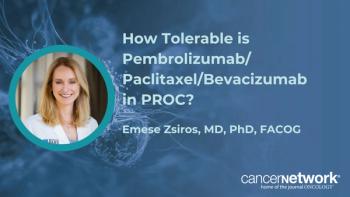
DETECT-A Blood Test Combined with PET-CT May Lead to Surgery with Intent to Cure
In this study, the feasibility and safety of DETECT-A coupled with PET-CT imaging to detect cancer was evaluated using a prospective, interventional study of 10,006 women not previously known to have cancer.
Data published in Science demonstrated that multi-cancer blood testing combined with PET-CT can be safely incorporated into routine clinical care, potentially leading to surgery in some cases with the intent to cure.1
The liquid biopsy test, called DETECT-A (Detecting cancers Earlier Through Elective Mutation-based blood Collection and Testing), was found to safely detect 26 undiagnosed cancers in over 9,900 women with no evidence or history of cancer, potentially enabling curative treatment.
“This study suggests that a multicancer blood test can be complementary and additive to standard of care screening and may be a good strategy for increasing early detection of cancer,” lead author Anne Marie Lennon, MBBCh, PhD, professor of medicine and interim director of the Division of Gastroenterology and Hepatology at the Johns Hopkins Kimmel Cancer Center, said in a press release.2
The feasibility and safety of multi-cancer blood testing coupled with PET-CT imaging to detect cancer was evaluated using a prospective, interventional study of 10,006 women not previously known to have cancer. Of the 10,006 women enrolled, 9,911 completed the study. Positive blood tests were independently confirmed by a diagnostic PET-CT, which also localized the cancer.
“The DETECT-A study incorporated PET-CT imaging to provide independent confirmation of the existence of a cancer and to precisely localize its site,” senior author Nickolas Papadopoulos, PhD, professor of oncology and pathology at Johns Hopkins, said in a press release. “For example, we could detect a lung cancer, tell in which lobe of which lung the cancer was located, the size of the cancer and if there were metastatic lesions present. Blood tests alone are not able to provide this type of precise information.”
Overall, the DETECT-A blood test was able to detect 26 cancers. Cancers initially detected by the blood test included cancers in 10 different organs, such as lymphomas (2), colorectal (2), appendix (1), uterine (2), thyroid (1), kidney (1), lung (9), breast (1), ovary (6), and unknown primary (1). Importantly, only women were chosen for the study because ovarian cancer only occurs in women, and the researchers wanted to ensure consistent comparisons.
Of the cancers detected, 15 underwent PET-CT imaging and 9 (60%) were surgically excised. Even further, 24 additional cancers were detected by standard-of-care screening and 46 by neither approach. Ultimately, only 1.0% of participants underwent PET-CT imaging based on false positive blood tests, and 0.22% underwent a futile invasive diagnostic procedure.
Notably, 17 cancers (65%) detected by the blood test were diagnosed at an early stage. Of the 26 patients with cancer detected by blood testing, 12 remain in remission and 8 remain in treatment or have stable disease approximately 9 months past diagnosis.
“Our primary goal was to demonstrate reliability and safety - to show the blood test could lead to the diagnosis of cancers and get patients to treatment aimed at curing them,” Kenneth Kinzler, PhD, professor of oncology and co-director of the Ludwig Center at Johns Hopkins, said in a press release.
Surveys conducted after the study demonstrated that blood testing did not deter individuals from participating in standard screening. Even further, the surveys showed high satisfaction with the study. Of 6,874 participants who completed a survey 12 months post-enrollment, only 0.3% reported feeling they made the wrong decision by participating in the study. Similar responses were collected from those who received true positive and true negative test results and from those who received false positive or false negative results, with only 1% of respondents saying they would be unwilling to join a similar subsequent study.
The researchers indicated that they intend to follow all 9,911 study participants, including those with positive and negative test results, for 5 years. The study authors suggested that it is likely that other cancers that were originally too meager to be detected by imaging or were not detected by the blood test will arise in these individuals.
Even further, the researchers indicated that additional studies reflecting an optimized version of DETECT-A are currently in the works.
“We believe that more than two-thirds of cancers that occur in the U.S. can eventually be screen-detected, either by blood testing or standard screening, before they cause symptoms of disease. Such earlier detection has the capacity to substantially reduce suffering and death from many cancer types,” Bert Vogelstein, MD, Clayton Professor of Oncology and co-director of the Ludwig Center at Johns Hopkins, as well as a Howard Hughes Medical Institute investigator, said in a press release.
References:
1. Lennon AM, Buchanan AH, Kinde I, et al. Feasibility of blood testing combined with PET-CT to screen for cancer and guide intervention. Science. Doi:10.1126/science.abb9601.
2. First study of multi cancer blood test to screen for cancer guide intervention [news release]. Johns Hopkins Medicine. Published April 29, 2020.
Newsletter
Stay up to date on recent advances in the multidisciplinary approach to cancer.










































